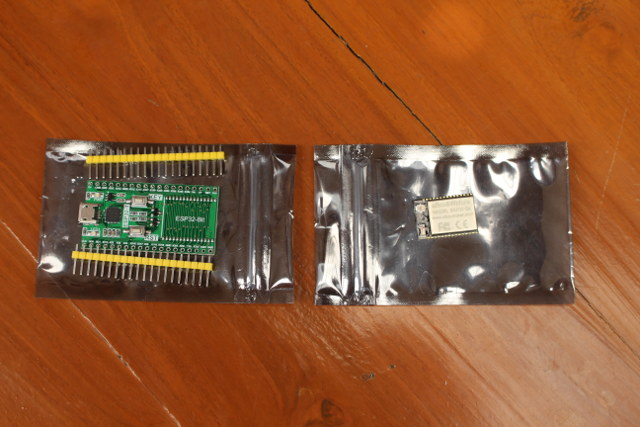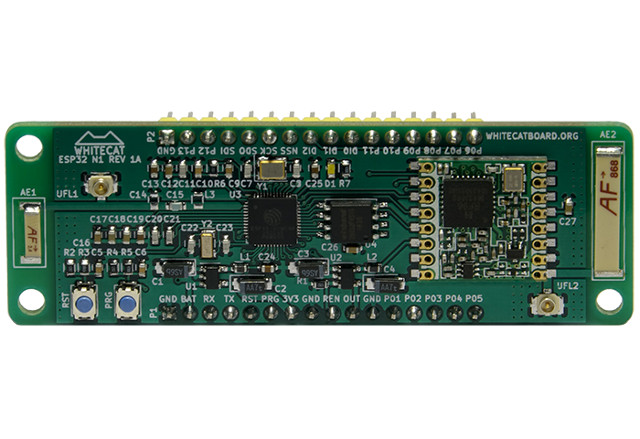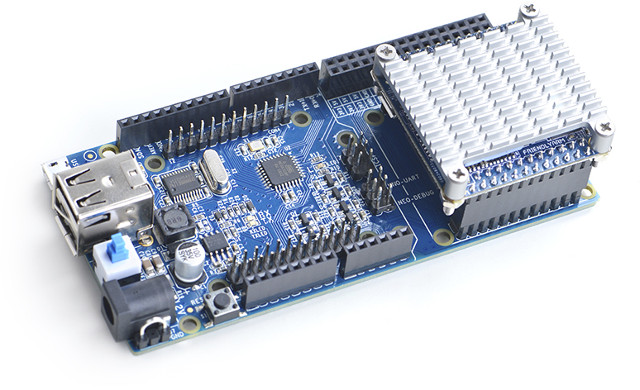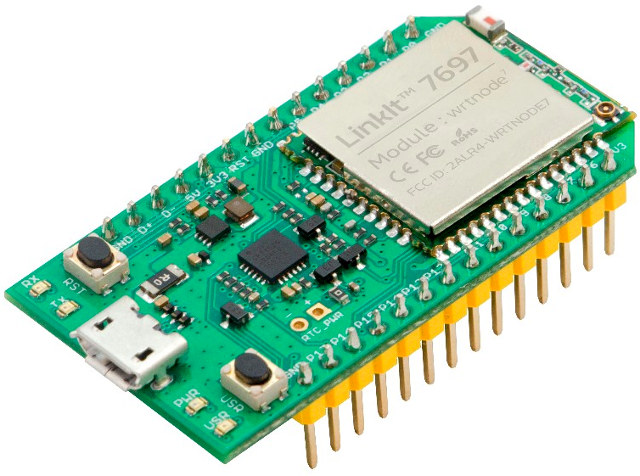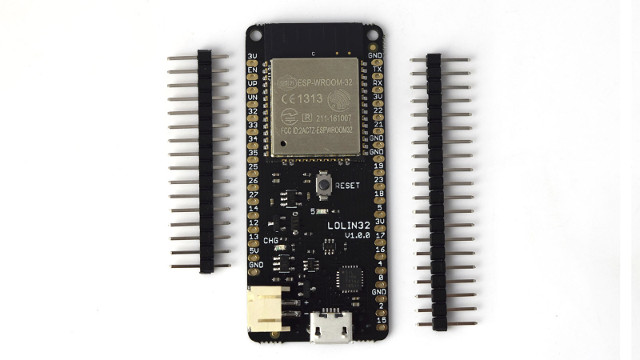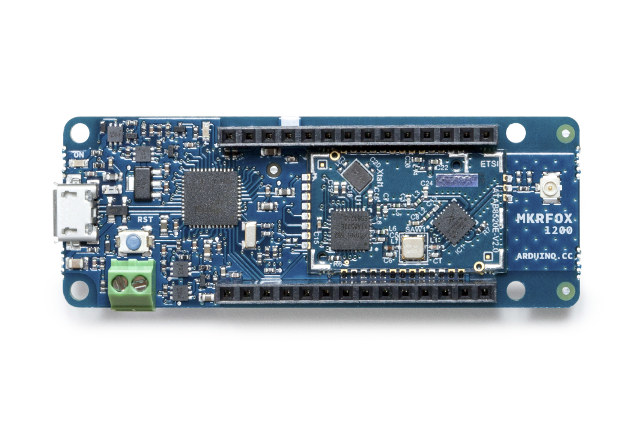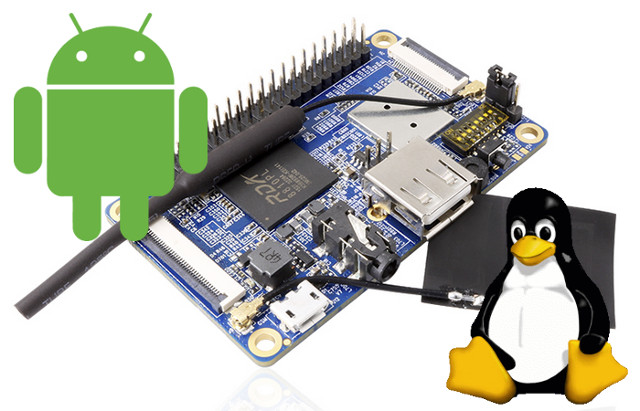Espressif ESP32 may have launched last year, but prices have only dropped to attractive levels very recently, and Espressif has recently released released ESP-IDF 2.0 SDK with various improvements, so the platform has become much more interesting than just a few weeks ago. ICStation also sent me ESP32-T development board with ESP32-bit module, so I’ll first see what I got, before trying out Arduino for ESP32 on the board. ESP32-T development board with ESP-bit Module – Unboxing & Soldering One thing I missed when I asked for the board is that it was not soldered, and it comes in kit with ESP32-bit module in one package, and ESP32-T breakout board with headers in another package. The 21.5x15mm module is based on ESP32-DOWNQ6 processor with 32 Mbit (4MB) of flash, a chip antenna, and a u.FL connector. The module is apparently made by eBox, and also used in Widora board with […]
Whitecat ESP32 N1 Board Combines ESP32 WiFi + Bluetooth SoC with a LoRa Transceiver, Runs Lua RTOS
Espressif ESP32 SoC is gaining traction right now as prices have come down, and there’s still an on-going fight among LPWAN standards with LoRaWAN being fairly popular in Europe. Whitecat, a group of engineers from several companies based in Citilab, Barcelona, Spain, has designed a board that combines both ESP32 and a LoRA transceiver, bringing an alternative to Pycom LoPy board, but instead of running MicroPython, they have developed Lua-RTOS. Whitecat ESP32 N1 hardware specifications: SoC – Espressif ESP32 dual-core Tensilica LX6 microprocessor @ up to 240MHz with 520kB internal SRAM Storage – 4MB flash memory Connectivity LoRa WAN transceiver working in the 868 (EU) MHz / 915 (USA) MHz with on-board antenna, and u.FL connector for external antenna Integrated 802.11b/g/n WiFi transceiver with on-board antenna, and u.FL connector for external antenna Integrated dual-mode Bluetooth (classic and BLE) I/O Headers – 2x 16-pin with SPI, I2C, I2S, SDIO, UART, CAN, […]
NanoPi NEO Boards Get a New Arduino UNO Compatible Dock to Play with Arduino Shields
FriendlyELEC has launched a new accessory board for their NanoPi NEO / NEO 2 / NEO Air boards with UNO Dock V2.0 board compatible with Arduino UNO board thanks to its Microchip ATMeaga328P MCU and compatible headers, and also equipped with headers to plug a NanoPi NEO board. Key features for UNO Dock v2.0 for NanoPi NEO: MCU – Microchip ATmega328 8-bit AVR MCU @ 16 MHz with 2KB SRAM, 32KB flash, 1024 bytes EEPROM USB – 2x USB 2.0 ports connected to NEO board Expansion Arduino UNO headers for shields Female headers to insert the NanoPi NEO board Male headers to access NanoPi NEO boards’ IOs Debugging & Programming – 1x micro USB port (USB to UART), ICSP header, NEO debug UART header Misc – Power on/off, reset button, UART select jumper Power Supply – 12V DC via 2.1mm power barrel The system would be great if NanoPi […]
$14 LinkIt 7697 Bluetooth 4.2 LE and WiFi IoT Board is Powered by Mediatek MT7697 ARM Cortex-M4 MCU
Mediatek Labs has launched a new IoT development, which on the surface looks similar to LinkIt Smart 7688 board, but the internal design is quite different as the MIPS processor and Linux OS, have been replaced by Mediatek MT7697 ARM Cortex-M4 processor running FreeRTOS, and beside WiFi, also includes support for Bluetooth 4.2 LE. LinkIt 7697 board specifications: Wireless SoC – Mediatek MT7697 ARM Cortex M4F MCU @ 192 MHz with 352KB RAM, 4MB flash, 802.11 b/g/n WiFi, Bluetooth 4.2 LE and a PMU Expansion – 2x 14-pin header with 18x GPIO, 2x UART, 1x I2C, 1x SPI, 18x PWM, 4x EINT, 4x ADC (0 to 2.5V), 1x IrDA, 1x I2S Debugging – 1x SWD, CP2102 UART to USB chipset Misc – Reset and user buttons; power and user LEDs Power Supply – 5V via micro USB port Dimensions – 48 x 26 mm The board can be programmed with […]
Wio GPS is a $40 Grove & Arduino Compatible Bluetooth 3.0 + GSM/GPRS + GPS Tracker Board
After Wio Link and Wio Node boards, Seeed Studio has added a new board to their Wio (Wireless Input Output) family with Wio GPS board based on Microchip SAMD21 Cortex M0+ MCU for Arduino compatibility, and Mediatek MT2503 ARM7 processor for GPS, Bluetooth 3.0, and 2G (GPRS) connectivity. Wio GPS board specifications: MCU – Microchip ATSAMD21G18A-MU ARM Cortex M0+ MCU @ 48 MHz with 256KB flash, 32KB SRAM Wireless SoC – Mediatek MT2503 ARM7EJ-S processor @ 260 MHz Storage – micro SD slot (shared with nano SIM slot) Connectivity (built-in MT2503 in Quectel MC20 module) Bluetooth 2.1 + EDR, 3.0 with SPP Profile and HFP-AG Profile; u.FL connector for external antenna Quad band 2G GSM/GPRS with u.FL connector for external antenna and nano SIM card slot GNSS – GPS + BeiDou + QZSS with u.FL connector for external antenna Audio – Speaker footprint (+/-), 3.5mm AUX jack with mic and stereo audio […]
$6.90 Wemos LoLin32 ESP32 Development Board Comes with 4MB Flash, Lithium Battery Support
Wemos – the company behind the cool Wemos D1 mini ESP8266 board – has now launched its first Espressif ESP32 development board with LoLin32 equipped with ESP-WROOM-32 module with 4MB flash, a micro USB port, and a battery header. Wemos Lolin32 specifications: Wireless Module – ESP-WROOM-32 based on Espressif ESP-32 dual core processor @ 240 MHz with 4MB flash Connectivity – 802.11 b/g/n WiFi + Bluetooth LE I/Os 26x digital I/Os 12x analog inputs UART, I2C, SPI, VP/VN, DAC 3.3V I/O voltage Breadboard compatible USB – 1x micro USB port for power and programming/debugging Power – 5V via micro USB + battery header for Lithium battery (charging current: 500mA max) Dimensions – 5.8 x 2.54 cm Weight – 5.8 grams The board is not compatible with Wemos D1 mini (34.2 x 25.6 mm) and shield, but offers a more powerful solution with Bluetooth LE, battery support, and more I/Os. The […]
Arduino MKRFOX1200 Board Combines Microchip SAM D21 MCU with Sigfox Module in MKRZero Form Factor
Arduino MKRFOX1200 is the first official Arduino board to feature LPWAN technology thanks to a Microchip ATA8520 Sigfox module combined with a Microchip SAMD21 ARM Cortex M0+ micro-controller, all that in the same form factor as MKRZero or MKR1000 boards. Arduino MKRFOX1200 specifications: MCU – Microchip SAMD21 ARM Cortex-M0+ MCU @ 48 MHz with 256KB flash, 32KB SRAM Connectivity – Microchip AT8520 Sigfox module operating @ 868 MHz with 2dB “GSM” antenna connected to u.FL connector 2x 14-pin headers for I/Os: 8x digital I/O 8x external interrupts (0, 1, 4, 5, 6, 7, 8, A1 -or 16-, A2 – or 17) 7x analog inputs (8/10/12-bit ADC) 1x analog out (10-bit DAC) 12x PWM pins ((0, 1, 2, 3, 4, 5, 6, 7, 8, 10, A3 – or 18 -, A4 -or 19) 1x UART, 1x SPI, 1x I2C 3.3V operating voltage DC Current per I/O Pin 7 mA USB – […]
RDA Micro RDA8810 Android SDK with Linux & U-boot Source Code for Orange Pi 2G IoT Board Released
Orange Pi 2G IoT board was released a couple of weeks ago, shortly followed by Android and Ubuntu images, but since it was not based on Allwinner, but an RDA Micro 8810PL processor, we did not have any source code so far, which can be a real problem for a development board… Shenzhen Xunlong has now managed to upload a 6.7GB Android SDK to MEGA, with the link published via Orange Pi Resources page. MEGA has a download limit which depends on how much traffic they get at the time, and after 5.3 GB download, I was asked to register for a PRO account, or wait for four hours before resuming the download. If you want to avoid this limit for any large MEGA download, you can run megadl instead. That’s what I did in Ubuntu 16.04 (remember to escape any special characters with \):
|
1 2 |
sudo apt install megatools megadl https://mega.nz/#F\!59EVmKAZ\!5FdBb2dQIMcxgY2h16nGPg |
Once the download is […]


